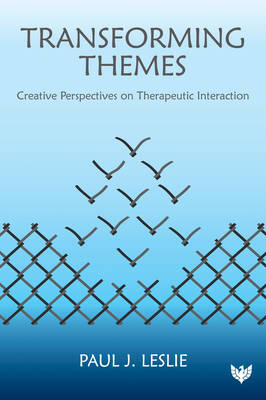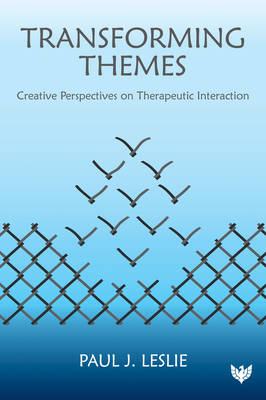
Je cadeautjes zeker op tijd in huis hebben voor de feestdagen? Kom langs in onze winkels en vind het perfecte geschenk!
- Afhalen na 1 uur in een winkel met voorraad
- Gratis thuislevering in België vanaf € 30
- Ruim aanbod met 7 miljoen producten
Je cadeautjes zeker op tijd in huis hebben voor de feestdagen? Kom langs in onze winkels en vind het perfecte geschenk!
- Afhalen na 1 uur in een winkel met voorraad
- Gratis thuislevering in België vanaf € 30
- Ruim aanbod met 7 miljoen producten
Transforming Themes
Creative Perspectives on Therapeutic Interaction
Paul J Leslie
Paperback | Engels
€ 34,45
+ 68 punten
Omschrijving
Transforming Themes challenges the dominant view of psychotherapy as a structured, reductionist process. Instead, it views psychotherapy as an alive, unrehearsed interaction that embraces healing when it is focused on the role of 'therapeutic themes'. These themes are the entrenched frames of references or contexts from which clients perceive their lives. In any interaction, each participant has a unique worldview. When clients come to therapy, they bring their problems in the form of a theme: 'the woman who can't forgive' or 'the child who is a terror'. Any potential statement or action performed within this theme merely strengthens the problem. Only when the theme of the therapy session has shifted can clients gain access to inner resources to shift perspectives and begin inner transformation. Effective therapy results from moving clients into more flexible, empowering themes. These changes occur as a result of the dynamic interaction between therapist and client, which embraces improvisation, creativity, and novelty, rather than adherence to specific theories or techniques. Using historical and modern research and colourful case studies, this work will help professionals understand how to easily adapt and apply creative and resourceful therapy interventions, no matter what therapeutic orientation they endorse. This book will enable therapists, counsellors, psychologists, and social workers to gain access to creative, effective methods which help their clients heal while increasing effectiveness and enjoyment in clinical work.
Specificaties
Betrokkenen
- Auteur(s):
- Uitgeverij:
Inhoud
- Aantal bladzijden:
- 160
- Taal:
- Engels
Eigenschappen
- Productcode (EAN):
- 9781912691982
- Verschijningsdatum:
- 8/07/2021
- Uitvoering:
- Paperback
- Formaat:
- Trade paperback (VS)
- Afmetingen:
- 150 mm x 229 mm
- Gewicht:
- 303 g

Alleen bij Standaard Boekhandel
+ 68 punten op je klantenkaart van Standaard Boekhandel
Beoordelingen
We publiceren alleen reviews die voldoen aan de voorwaarden voor reviews. Bekijk onze voorwaarden voor reviews.









